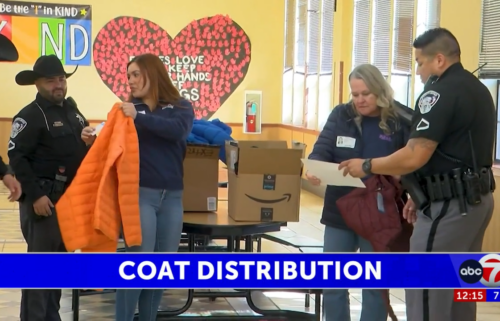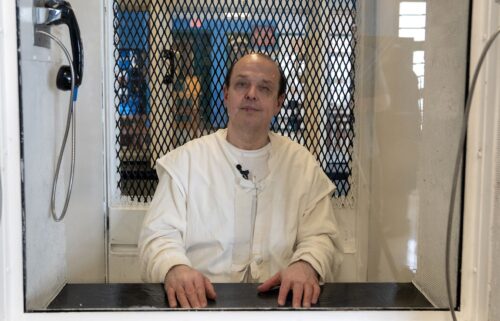Texas governor orders cleanups of Austin homeless encampments after the city relaxed its laws

Tent cities emerged across Austin this summer after the city effectively made it legal for homeless residents to camp under highway overpasses.
The move sparked a fierce debate across the city over the best way of dealing with what some residents describe as a homelessness crisis.
Steve Adler, Austin’s mayor, says while it might seem that the homeless population has grown, the new city ordinance decriminalizing city camping has simply brought people experiencing homelessness out of the shadows.
“They’re more visible and I know that’s disconcerting to a lot of people. It’s disconcerting to see poverty in this city,” Adler said. “We haven’t created any more people experiencing homelessness.”
The mayor argues that by allowing homeless residents to camp on city streets, it’s made their lives safer. He says fewer are sleeping hidden away in the city’s wooded areas.
The city’s approach has drawn the ire of Texas Gov. Greg Abbott. The Republican governor has unleashed months of social media attacks arguing the relaxed rules spurred lawlessness and indecency in the streets. Even some frustrated Democrats in this liberal city find themselves applauding the Republican governor after he used state resources on Monday to clean up the underpasses.
The Texas Department of Transportation posted notices last week at 17 locations announcing it would soon clear out the encampments. Just days later, workers in bright orange vests were scooping up piles of trash and left-behind belongings. The sounds of shovels scraping the concrete competed with the deafening roar of cars driving overhead.
The controversial cleanups started Monday under a highway in the southwest part of the city. However, the cleanups only went so far. It’s still legal for people to camp under the highways due to the city’s revised ordinances, and many of the homeless are expected to return.
William Rainey, 56, knew the cleanup was coming and he packed up all of his belongings into two shopping carts. He sat and watched the crews fill dumpsters of discarded items. Rainey says he welcomes the cleanup to remove trash but that the efforts aren’t going to help homeless people like him.
Rainey ended up on the streets two years ago. He says his life unraveled after his wife died and he fell into a bad crowd. Now he describes himself as “depressed, down and out.” He says after the city changed its camping ordinance he moved out of the woods and started sleeping under the bridge that was being cleaned out.
“I’m safe. I feel safe. I’m around people that I know, that camp with me,” Rainey said. “Some people don’t like homeless people. They’d rather not see us out here.”
Chris Baker, the executive director of a homeless advocacy group called The Other Ones Foundation, loaded up a white truck with bicycles, bags, and tents amid the cleanups, sparing them from becoming trash.
“This is theater, this is political theater,” Baker said of the cleanups. “This is just a shuffling around of people that will go on and on forever until we find places that people can be… safe and they can be stable.”
John Wittman, a spokesman for the governor’s office, said Abbott would order the cleanups on a weekly basis — or even more often, if need be — while the state continues to work on what it says is a plan for a longer-term option.
In the meantime, homeless residents like Andrea Aguilar say they’re going to keep returning to the underpasses as long as possible.
“I’m not going to run and hide in the woods,” said Aguilar, who packed up her things and kept them just off to the side of an underpass, waiting for the state to come do the cleanup on Monday. “I’m going to go right back under the bridge. Right back under there.”
‘Austin is way too kind’
In June, the city council made it easier for homeless people to sit, lie, and camp in more spaces across Austin, including many sidewalks. Previously, homeless residents were ticketed for such actions, leading to court dates and fines that people wouldn’t attend or pay. That made it harder for them to get jobs and housing, said Chris Harris, a homeless advocate who works with a group called Homes Not Handcuffs.
The new rules also made it possible for the homeless to congregate in the downtown area and stay closer to resources and jobs, rather than in the woods, away from view. “People that have come out of hiding now are getting medical attention that they weren’t getting,” said Adler. “They are getting access to housing and services in ways that did not happen before.”
The outcome resulted in fierce pushback from some business owners and residents across the city. They formed groups opposing the new rules, and launched a petition against the ordinances. Some were seen Monday gathering signatures to recall the mayor.
Mark Garcia, who leads the group Take Back Austin, said he’s not protesting homelessness but what he called the vagrancy of those taking advantage of the new rules and being homeless by choice. “The vagrants are clogging up the system and preventing actual homeless people from getting the resources that they need.”
Rainey, who’s been residing under an overpass, expressed frustration with others who lived there and who wouldn’t pick up their own trash. “A lot of homeless people are taking advantage and they just don’t care. If everybody cared, we… wouldn’t have this problem at all. They wouldn’t be coming out here to have to clean up.”
Another man who said he was recently out of prison and now lived under an Austin overpass said he doesn’t blame people who are upset about the new rules. “I wouldn’t want to see my city like this.”
“Austin is way too kind,” he continued. “I’m from Houston. They would never let me do this.”
Aguilar said the new rules are simply letting people live more comfortably while homeless. “And why can’t we be comfortable?”
‘It’s a bizarre world’
Austin resident Cleo Petricek formed a group called the SAFE Project that has tracked crime near homeless encampments and shelters since the new ordinances went into place. She actively lobbies the city council to come up with another solution to the homelessness problem.
A diehard Democrat, Petricek feels frustrated that she’s now supporting the actions of a Republican governor, but she’s glad someone is using their “bully pulpit to say ‘Hey, Austin, this needs to stop right now.’ We’re at a crisis point.”
Kent Dahlgren, who described himself as a progressive Democrat, moved to Austin from Portland after the Oregon city’s relaxed rules on homelessness affected his wife’s business. He said people would sleep and defecate outside the door of the business and harass customers.
Though he feels the new rules in Austin are rooted in compassion, the end result is “catastrophe,” and he worries it will turn the political makeup of the city. “I’ve never voted Republican, and I’m worried they’re going to turn this town red.”
Dahlgren said he can’t believe he lines up with politicians like Abbott or even President Donald Trump, who’s been admonishing West Coast cities over how they’re handling homelessness. “It’s bizarre,” he said, expressing bewilderment that he agrees with Trump’s rhetoric. “It’s a bizarre world.”
In the same vein, Abbott has also taken to Twitter to scold the state’s capital and Democratic mayor, posting videos — some of which have now been debunked — of what he claims are homeless people causing disarray in Austin. He drew outrage after he retweeted video of a man attacking a car at a stoplight and implied the man was homeless. The man’s family told CNN he was not homeless, but was mentally ill and was not taking his medication that day.
Critics felt the governor was inflaming the homelessness issue in Austin by worsening stereotypes and stoking fear. Abbott did not respond to a CNN request to be interviewed for this story.
Last month, the governor threatened that if the city didn’t drastically change its laws by November 1, the state would intervene. He took his first step on Monday with the cleanups under highways, but he also listed other measures the state could enact in Austin, such as bringing in the Health and Human Services Commission to address what he called public safety concerns or using the attorney general’s office to seek “civil penalties for violations of Texas statutes and rules requiring abatement of public health nuisances.”
Critics say Abbott is merely politicizing the issue and playing to his base, not creating any meaningful solutions.
“I don’t think he cares about homeless people. I think he cares about the homeless issue in so far as he… wants it to be eradicated,” said Baker, the homeless advocate. “If this is the solution that… they’re going to try to bring, this is no solution at all.”




